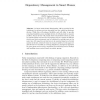Free Online Productivity Tools
i2Speak
i2Symbol
i2OCR
iTex2Img
iWeb2Print
iWeb2Shot
i2Type
iPdf2Split
iPdf2Merge
i2Bopomofo
i2Arabic
i2Style
i2Image
i2PDF
iLatex2Rtf
Sci2ools
107
click to vote
DAIS
2009
2009
Dependency Management in Smart Homes
In future smart homes functionality will be provided to the inhabitants by software services decoupled from the underlying hardware devices. While this will enhance flexibility and will allow to provide cross-functionalities across multiple devices it will also lead to resource conflicts. Future devices will provide basic functionalities which are used by separate higher level services. Each person will use a number of different services and each environment can be inhabited by multiple users at the same time. All respective services have to be executed based on a limited number of devices, which will result in resource conflicts. In this paper we describe how we extended our existing dependency management approach for smart home services with a mechanism for monitoring service bindings and handling access control based on priority groups.
Related Content
| Added | 09 Nov 2010 |
| Updated | 09 Nov 2010 |
| Type | Conference |
| Year | 2009 |
| Where | DAIS |
| Authors | Daniel Retkowitz, Sven Kulle |
Comments (0)

